Pope Francis

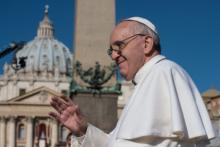
Pope Francis on Thursday washed the feet of 12 young inmates, including two girls and two Muslims, during a Maundy Thursday Mass at a youth detention center in Rome.
The Argentine pontiff, who has shown an eagerness to break with tradition in the two weeks since his election to the papacy on March 13, chose to celebrate the rite in the Casal del Marmo prison in northwest Rome, rather than in the traditional venue of the St. John Lateran Basilica.
Francis has repeatedly stated his desire to bring the papacy and the church closer to the poor and the marginalized.

In his first general audience since his election to the papacy, Pope Francis on Wednesday urged Catholics to leave their comfort zone to search for “lost sheep.”
As the Catholic Church prepares for Easter and celebrates the rites of Holy Week, Francis told around 20,000 people in St. Peter’s Square to avoid “a tired and routine way of living the faith,” and resist “the temptation to withdraw into pre-established patterns that end up closing our horizon” to God.
“We must not be content to remain in the enclosure of the 99 sheep; we have to step outside, to search for the lost sheep,” he added, referring to a parable of Jesus.
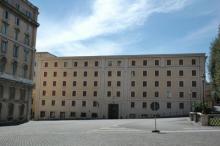
VATICAN CITY — Shunning the spacious papal apartment used by his predecessors, Pope Francis has chosen to continue living in the Vatican guesthouse where he has been staying since the beginning of the conclave.
The Vatican’s chief spokesman, the Rev. Federico Lombardi, explained on Tuesday that Francis will live “until further notice” in a suite in the Santa Martha Residence, a modern Vatican guesthouse for priests and bishops who work in the Roman Curia or who are visiting the Vatican for meetings and conferences.
Francis made his intentions clear on Tuesday morning, while celebrating Mass in the residence’s chapel for its permanent guests, who occupy about half of the residence’s 130 or so rooms.
The pontiff’s choice is a consequence of his desire to adopt a “simple” living arrangement that allows him “to live in community” with other priests and bishops, Lombardi explained.
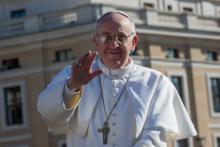
Since the moment of his election on March 13, Pope Francis has been warmly embraced by his own flock and even the media and the wider public in a way his bookish predecessor, Benedict XVI, was not.
Such an effusive welcome is especially good news for Catholic leaders who spent years fending off criticism of Vatican dysfunction under Benedict and a cloud of scandal and crisis at home. And the hot start for Francis is also crucial in building up a reservoir of good will that will be needed when the new pope refuses to bend on unpopular teachings or commits a gaffe of his own. Polls show that anywhere from 73 percent to 88 percent of American Catholics say they are happy with the selection of Francis, as opposed to about 60 percent who were happy with the choice of Benedict — and many of those are extremely pleased with the new pope.
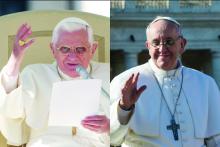
Now that the cardinals have elected and installed their new boss, Pope Francis can get to work being the Roman Catholic pontiff, with his next order of business doing something no other pope has done in centuries: meet the guy he replaced.
Benedict’s resignation — the first by a pope in 600 years — paved the way for the conclave that elected Francis on March 13, but it also created an almost unprecedented potential for confusion and division in a church hierarchy that has room for only one pope at a time.That will happen on Saturday, when Francis is scheduled to travel a few miles outside Rome to the hilltop town of Castel Gandolfo, the summer papal residence where Benedict XVI has been staying — out of sight — since he resigned and left the Vatican on Feb. 28.
“Benedict XVI could turn into a shadow pope who has stepped down but can still exert indirect influence,” said Hans Kung, the dissident Swiss theologian and friend (as well as frequent critic) of Benedict’s since he and the former Joseph Ratzinger were up-and-coming theologians.
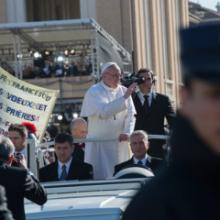
VATICAN CITY — Pope Francis on Friday called for more intense dialogue between religious leaders, particularly Muslims, as he tries to recalibrate relations between the world’s two largest religious groups.
Speaking in the Vatican’s majestic Sala Regia, the Argentine pontiff said that part of his mission is to connect “all people, in such a way that everyone can see in the other not an enemy, not a rival, but a brother or sister.”
In a meeting with Vatican diplomats and foreign leaders, Francis also reaffirmed the church’s commitment to protect the poor and the environment, an early theme in his young pontificate.
“Fighting poverty, both material and spiritual, building peace and constructing bridges: these, as it were, are the reference points for a journey that I want to invite each of the countries here represented to take up,” the pope said.

Even as a non-Catholic, I was filled with hope when an Argentine cardinal said to be passionate about serving the poor stepped onto the balcony overlooking St. Peter’s Square as Pope Francis.
By taking the name of a church reformer, the former Cardinal Jorge Bergoglio promised a better day for an ossified institution whose people beg for hope while hierarchs defend medieval power and pomp.
By standing in silence and bowing his head for the crowd’s blessing, Francis showed a humility that could inspire believers grown weary of Roman arrogance. In greeting the crowd, the new pope showed a common touch that could repurpose a global movement from being lost in scandal and self-serving.
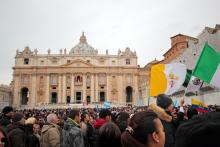
Editor's Note: Pope Francis delivered the following homily at his inaugural Mass on Tuesday, emphasizing the need to protect the poor and the environment.
Dear Brothers and Sisters,
I thank the Lord that I can celebrate this Holy Mass for the inauguration of my Petrine ministry on the solemnity of Saint Joseph, the spouse of the Virgin Mary and the patron of the universal Church. It is a significant coincidence, and it is also the name-day of my venerable predecessor: we are close to him with our prayers, full of affection and gratitude.
I offer a warm greeting to my brother cardinals and bishops, the priests, deacons, men and women religious, and all the lay faithful. I thank the representatives of the other Churches and ecclesial Communities, as well as the representatives of the Jewish community and the other religious communities, for their presence. My cordial greetings go to the Heads of State and Government, the members of the official Delegations from many countries throughout the world, and the Diplomatic Corps.
In the Gospel we heard that "Joseph did as the angel of the Lord commanded him and took Mary as his wife" (Mt 1:24). These words already point to the mission which God entrusts to Joseph: he is to be the custos, the protector. The protector of whom? Of Mary and Jesus; but this protection is then extended to the Church, as Blessed John Paul II pointed out: "Just as Saint Joseph took loving care of Mary and gladly dedicated himself to Jesus Christ’s upbringing, he likewise watches over and protects Christ’s Mystical Body, the Church, of which the Virgin Mary is the exemplar and model" (Redemptoris Custos, 1).
How does Joseph exercise his role as protector? Discreetly, humbly and silently, but with an unfailing presence and utter fidelity, even when he finds it hard to understand. From the time of his betrothal to Mary until the finding of the twelve-year-old Jesus in the Temple of Jerusalem, he is there at every moment with loving care. As the spouse of Mary, he is at her side in good times and bad, on the journey to Bethlehem for the census and in the anxious and joyful hours when she gave birth; amid the drama of the flight into Egypt and during the frantic search for their child in the Temple; and later in the day-to-day life of the home of Nazareth, in the workshop where he taught his trade to Jesus.
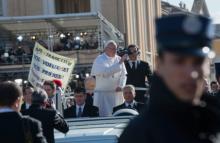
VATICAN CITY — Pope Francis issued a powerful call for the protection of the environment and of society’s most vulnerable during his formal installation Mass at the Vatican, while qualifying his papal power as a “service” to the church and to humanity.
The pope on Tuesday celebrated a solemn Mass in St. Peter’s Square in front of an estimated 200,000 people, as well as political and religious leaders from all over the world.
During the Mass, Francis received the symbols of his papal authority over the world’s 1.2 billion Roman Catholics: the pallium, a lamb’s wool stole that recalls Jesus as the Good Shepherd, and the “ring of the fisherman.”
In keeping with the low-key style that has been the hallmark of his pontificate so far, Francis presided over a somewhat simpler, and definitely shorter, rite than the one that marked the start of Benedict XVI’s reign in 2005.
Francis was slowly driven around a sun-drenched St. Peter’s Square in an open-top car, shunning the bulletproof, air-conditioned popemobile preferred by his predecessors. At one point, he asked to stop the car and got out to bless a disabled person.
In his homily, delivered in Italian, Francis described the church’s mission as “respecting each of God’s creatures and respecting the environment in which we live.”
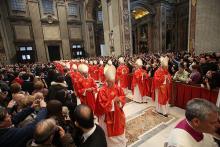
Last Sunday night, the Rev. Thomas Rosica was walking through the Piazza Navona in Rome’s historic center when he bumped into Cardinal Jorge Bergoglio, who he has known for years. Bergoglio was walking alone, wearing a simple black cassock and he stopped and grabbed Rosica’s hands.
He had reason to be worried. Two days later, on Tuesday evening, he and 114 other cardinals entered the conclave to elect a successor to Benedict XVI; a little more than 24 hours and five ballots after that, Bergoglio emerged on the balcony of St. Peter’s Basilica as Pope Francis. “I want you to pray for me,” the Argentine cardinal told Rosica, a Canadian priest who was assisting as a Vatican spokesman during the papal interregnum. Rosica asked him if he was nervous. “A little bit,” Bergoglio confessed.
It was a surprising outcome, and even if Bergoglio suspected something was up, few others did, including many of the cardinals in the Sistine Chapel with him.
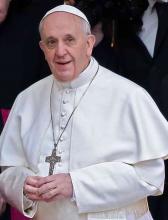
Only a day into his papacy, and I’ve got to admit, Pope Francis has my attention. In an editorial piece on the Sojourners website today, Jim Wallis cited a surprising and very heartening quote from the new pontiff, especially for those looking in from the outside as non-Catholics. Here’s an excerpt from one of his first public addresses:
“We have to avoid the spiritual sickness of a self-referential church. It’s true that when you get out into the street, as happens to every man and woman, there can be accidents. However, if the church remains closed in on itself, self-referential, it gets old. Between a church that suffers accidents in the street, and a church that’s sick because it’s self-referential, I have no doubts about preferring the former.”
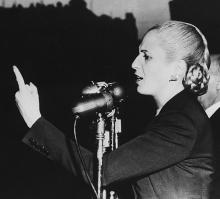
In 1974, when the Rev. Jorge Bergoglio was the top Jesuit in his native Argentina, a former nightclub dancer named Isabel Peron came to head the nation – an accidental and weak president.
Isabel Peron served less than two years in office before a right-wing military coup placed her under house arrest, and launched a seven-year campaign of torture and killings of tens of thousands of trade unionists and other leftists: Argentina’s Dirty War.

Jesuits are bound by oath not to seek higher office in the Roman Catholic Church, and now one of them has been elected to its highest office: Bishop of Rome, Vicar of Christ, Pontifex Maximus.
“On the one hand, Jesuits aren’t supposed to be in positions of authority,” said the Rev. Joseph Fessio, a Jesuit and founder of Ignatius Press. “On the other hand, they’re supposed to be obedient to the church.” Pope Francis, the first Jesuit to become pope, not only represents a paradox for the papacy, but also the larger history of the Society of Jesus, as the Jesuits are formally known.
The Jesuits have played a key role in the history of the church. For centuries, they have served as its leading missionaries, founded its most prestigious universities and committed themselves to alleviating the deepest poverty.

With the words “Habemus papam” — we have a pope — Roman Catholics had a new leader, and the wider world had a new ministry to watch.
The direction the new pope takes his flock is of great importance for committed Catholics, but the papacy is also closely watched by other faiths. The pope wields vast influence as the world’s most powerful moral leader and the public face of Christianity.
Leaders of other faiths appeared to embrace the selection cautiously, not unlike some Catholics themselves, offering prayers and congratulations, but also using the opportunity to lay out their own hopes for the new pontiff. Pope Francis of Buenos Aires, formerly Cardinal Jorge Bergoglio, emerged from the conclave as the first pope from outside Europe in modern times, the first Jesuit, the first from Latin America, and the first named Francis, in honor of St. Francis of Assisi, who dedicated his life to helping the poor.
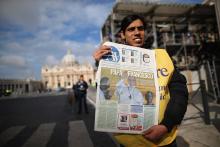
When I heard about the white smoke on Wednesday, I wrote on my Facebook wall: “Habent Papum.” My own church doesn’t use Latin, so I had to use Google translate to figure out how to change the “We have a pope” of “Habemus Papam” into “They have a pope.” I got a few good laughs for my cleverness before a Catholic friend humbly reminded me that it wasn’t just their pope, and that I’d have to deal with him too ... he has no idea how prophetic his words have turned out to be.
You see, I didn’t expect to tune in at all to the election of the pope. I was raised in the Catholic Church and received its early sacraments before my family joined the Episcopal Church (my father’s tradition). I spent plenty of time in high school and after defending its practices and traditions against atheists and Protestant friends and colleagues, and I more than made up for that by pressing hard on my Catholic friends on the nuances I didn’t understand. But mostly I only paid attention when the Catholic Church said something publicly or took a political stand on an issue I cared about.
But on Wednesday, the white smoke got in my eyes, and rather than confusing my sight, it’s made things a little clearer.
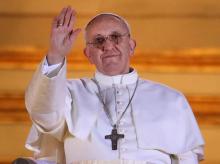
Francis. Pope Francis. This could be good news for the Catholic Church, for the whole church, and for the world. Let’s hope and pray so.
Jorge Bergoglio, the Argentinian cardinal from Buenos Aires, will be the first pope from Latin America and the first outside of Europe in a millennium. That’s good news from the start. And the world is now learning about the 76-year-old new pontiff whose election caused the white smoke to rise in the night skies of Rome to the cheers of tens of thousands of people in St. Peter’s Square. A Jesuit scholar, he seems to be a humble man who lives simply, choosing to live in a small apartment instead of the archbishop’s palace, and travel on buses and trams instead of in the church limousine.
Will simplicity and social justice become the witness of the Roman Catholic Church around the world — and will it emanate from the first pope from the Global South, which is clearly the growing future of the church? What good news that would be.
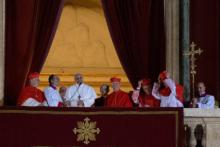
VATICAN CITY — A hierarchy looking to make a clear statement about where the troubled church is headed chose on Wednesday the first member of the influential Jesuit order to be the next pope. Yet they also chose Cardinal Jorge Mario Bergoglio, a humble man who lives simply and took the name Francis (also a first) that evokes the founder of another great religious order.
The College of Cardinals picked the first non-European in modern times, as well – yet he is the son of Italian immigrants and grew up in Argentina, perhaps the most European of any country in Latin America.
And the cardinals above all wanted a pastoral figure who would project an image of vigor and warmth to the world after the eight-year reign of Pope Benedict XVI — an introverted, gaffe-prone German theologian who was 78 when he was elected and retired last month at 85, saddled by the burdens of this very public office.
Yet in his stead they chose a soft-spoken a 76-year-old who has been rapped for rarely cracking a smile — an image that Bergoglio did little to dispel with his low-key introduction as Pope Francis to the expectant crowd in St. Peter’s Square on a rainy Roman evening.
“Buona sera,” Francis said in deliberate, word perfect Italian, with just a slight Spanish accent. “You all know that the duty of the conclave was to give a bishop to Rome. It seems that my brother cardinals have come almost to the ends of the earth to get him … but here we are.”
So what, in fact, does the election of Francis say about the Catholic Church at this point in its history?
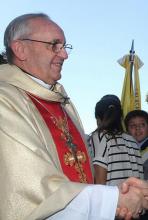
Argentinian Cardinal Jorge Mario Bergoglio was elected as Pope Francis I on Wednesday, after only two days of voting in the conclave tasked with choosing a successor to Pope Benedict XVI.
According to anonymous reports of the 2005 conclave, he was the leading contender against then-Cardinal Joseph Ratzinger, who became Benedict XVI. Bergoglio, 76, has served as the archbishop of Buenos Aires since 1998 and was made a cardinal in 2001. He is the first Latin American and the first Jesuit to rise to the papacy.
In his first address to the huge crowd that had gathered in St Peter’s Square, Francis asked for the prayers of “all men and women of good will” to help him lead the Catholic Church.